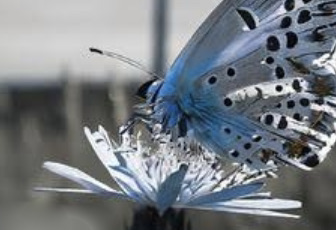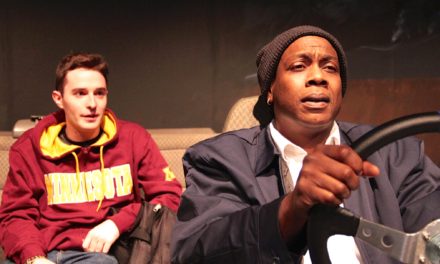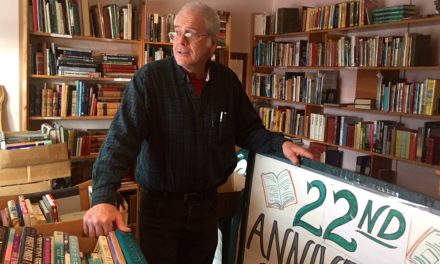The Book
Title: The Fragile Blue Dot: Stories from Our Imperiled Biosphere
Author: Ross West
Publisher: GladEye Press (Springfield, Ore.), 2024; online bookstore of fiction and non-fiction works at gladeyepress.com
By Daniel Buckwalter
Multiple story lines collide painfully in The Fragile Blue Dot: Stories from the Imperiled Biosphere by Ross West, and sometimes you’re not sure who is on the side of the angels in regards to climate change.
The residual emotional baggage that ordinary people suffer from in this tug-of-war between planet advocates and climate deniers is the foundation of the book, a collection of 15 fiction short stories by West, that was published in April. All 15 stories are quick reads, but I would advise against reading them in one sitting.
It would be best to absorb this book in bite-sized chunks because each story possesses an in-depth and clear-eyed look as to why societies around the globe — individuals, families and corporations — have a hard time pivoting from their industrial-age focus to face the onslaught of challenges that climate change brings us.
Climate change is a clear and present danger to the planet and its inhabitants, yet well-heeled deniers as well as those sympathetic to science both can cruelly, even grotesquely, distort this basic narrative in the name of money and one-upmanship power. Innocent people are left to fend for themselves.
West, an author and essayist from Eugene, understands the impulses and conflicting pressures people feel (fear, really) in the face of imminent catastrophe, clinging to their values and beliefs, and suffering through lesser-evil choices.
There is love altered in the story If Anything Changes and love lost in Cowabunga Sunset, two stories that highlight how climate change can drive a wedge between people. Also, there is the story of Kali in All by Herself. Kali is a teenager of divorced parents who decides to emulate young Swedish activist Greta Thunberg, much to the chagrin of her mother who misses the family that once was.
There’s Stedman Compazzo in The Man Who Almost Saved The World. Compazzo, who is dying of cancer, is a frustrated United Nations administrator who chooses self-immolation during a livestream after failing to convince world leaders to incorporate population reduction measures into a climate change treaty.
The business angle of climate change is examined in the story, Plans. Colin Parsons is the wealthy founder of a media empire called Half-Shell Adventures, who has written books and done TV segments extolling the virtues of traveling Europe for adventures (think Rick Steves of PBS fame).
Then Parsons meets Deirdre O’Fallon, who is doing doctoral research on tourism and its global impacts. She notes the 100,000 global flights that take off each day, each jet emitting greenhouse gasses and raising the sea levels a little more.
Parsons decides to revamp the company. Half Shell Adventures will now go green — slowly, on the advice of the board of directors. (“Our fiduciary responsibility is to the shareholders,” one board member says). And perhaps too slowly for one man who leaks internal documents to The New York Times — (he’s all in favor of “eating the rich”) — and creates a firestorm that will likely put Half Shell Adventures out of business.
“Look, you got rich flying around the world writing your little guidebooks to help other rich people fly around the world and consume and pollute,” the leaker tells Parsons. “Like there’s no tomorrow. But there is. And if it isn’t going to totally suck, things have to change.”
The corporate business aspect of climate change meets raw politics in the final story of The Fragile Blue Dot, and it is the story that rings most true of all.
The Burning Planet tells the story of aspiring filmmaker Luke Mayfield and his documentary, Simple, Not Easy, which wins the Pemberton Prize and nets Mayfield $10,000 in prize money and a much needed boost to his career.
That’s only the start of the story. It’s a presidential election year, and progressive presidential candidate Mim Donohue has noticed the film. She wants to single it out as well as Mayfield at a campaign stop in Portland.
Mayfield will become well-known in the election cycle, with interviews and job opportunities everywhere. His film will also be a prop for planet advocates and a lightning rod for deniers, and the story’s frighteningly plausible ending should haunt you after you close the book.
Author West knows the subject of climate change well. He worked as a science writer in communications for the University of Oregon for a decade, ending in 2014, and also was managing editor of of the UO’s Oregon Quarterly as well as a member of the National Association of Science Writers and text editor on both editions of the Atlas of Yellowstone in 2012 and 2022.
The Fragile Blue Dot is an understated and skillful look via fictional short stories at the consequences of climate change to humans in Western Civilization. Those consequences are starting to hit home now. Climate change is here, and it’s real.
West doesn’t offer solutions in the 15 stories, just the profound human costs to doing nothing. As I’ve stated, read The Fragile Blue Dot slowly, two stories at a time. Absorb each story’s impact on individuals, families and industries.
The Fragile Blue Dot should be required reading for everyone this summer.











Great review! We’re so proud of Ross’ book and thrilled that you think it should be required reading. — GladEye Press